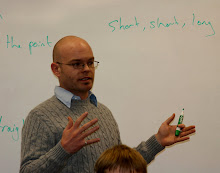Handicapping Factors
- Professional development focused on skill instead of how computers can enhance learning.
- School districts are not making accomodations to fully utilize technology, failing to provide long term professional development, limiting access to hardware and software, and on-site tech support and instructional leadership.
- Discord bewteen technology use and actual learning.
- Misconception that all software is equally useful as a teaching tool.
With these factors in mind Burns elaborates on strategies, emphasizing spread sheets and databases, that will encourage higher order thinking skills. With challenge and inefficiency comes change...
Strategies for Change
- Teach critical thinking first, technology later: teachers need to help students to question and encourage them to create before turning them loose with technology. We must remember that computers are technology not a talisman.
- Focus on curriculum, instruction, and assessment rather than the tool:
- teachers need to experience technology through professional development: teachers become students
- professional development needs to provide teachers with a conceptual framework for understanding higher order software
- model tech use matched to a specific learning outcome
- focus on content knowledge, curriculum, instruction, and assessment
Much of what Burns claims is a reality in our schools: kids are plugged in to computers in order to occupy their time as worksheets have done in the past. I appreciate how Burns advocates for maintaining teaching principles in using technology as a tool rather than a gift from a higher power. If teachers are to effectively use computers, we need to apply basic principles of learning to these fantastic tools.

